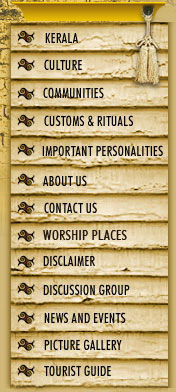DEVADIGA
‘Deva’ means deity or god and ‘adiga’ means servants. So Devadiga are the servants of gods. They believe in Hinduism and celebrate almost all Hindu religious festivals. Devadiga are seen in Kasargode District and they are chiefly musicians in Hindu temples. They also assist priests of temple. They are grouped as Other Backward Classes. They speak Tulu and Kannada.
Devadiga perform puberty rites known as Karapattavanu. When the girl attains maturity she is secluded for five days. On the fifth day she is given pacificator bath and make her pollution free. Arranged marriage is the practice followed by Devadiga. Nichaya (betrothal function) is performed before marriage at the bride’s residence. Marriage is taken place at the bridegroom’ s residence. Bride’s brother lead the bridegroom to the marriage mantap (stage) and bridegroom’s sister brings the bride. Then they have to go round the mantap seven times. After seating side by side at the mantap, the bridegroom ties thali around the neck of bride.
The Devadiga cremate dead. Eldest son lights the pyre on the head side and youngest son on the leg side. Sanchayanam otherwise known as boodi muttune is done on the fifth day and Death pollution (pula) continues for 12 days. On the 13th day funeral function known as Saavu take place.
DEVANGA
The Devanga are migrants from Karnataka and Andhara Pradesh. They are seen in Palakkad and Thrissur districts. They are also known as Chetty and Chettiyar. According to legend, they are the children of Devalan, a creation of Lord Shiva to weave cloth. There are two groups among them – Telugu Devanga and Canarese Devanga. In addition to Telugu and Canarese groups, there exist sections viz.,Hathinentu maneyavaru (eighteen house men), Sivachara, Arya and Kodekkal Hatakkararu (weavers). They use Telugu, Kannada, Tamil and Malayalam as their languages.
Devanga performs Therandukuli or therandukalyanam (puberty rites) and pollution lasts for 10 days. Till the tenth day, the girl is kept aloof in a hut made out of the house. She is given purification bath on the 11th day. In the past arumaikalyanam (child marriage) was practiced. They perform Seemantham (pre-delivery ritual) in the seventh month. Parents of pregnant woman take her to their home where delivery takes place. Post delivery pollution continues for 11 days. Namakaranam (peridal) (naming) ceremony and Choroonu (first rice feeding) ceremony is held on seventh month. Mottaaidaikyaradu or Mudiedukkaradu (tonsure ceremony) for boys and kadukuttal (boring of ear) is done on the first year.
|



